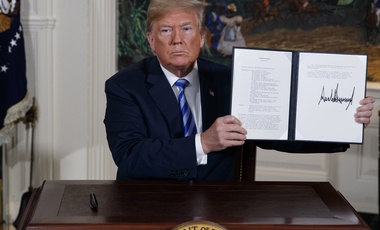
The European Union and the United States have confirmed that the removal of sanctions on Iran constitutes an “essential part” of the Iran nuclear agreement, also called the Joint Comprehensive Plan of Action (JCPOA), whose revival is the subject of ongoing talks in the Austrian capital, Vienna, since early in April.
“The European Union and the United States recognize that, alongside the return to the full and effective implementation by Iran of its nuclear-related commitments, the lifting of sanctions constitutes an essential part of the JCPOA,” the EU and the US said in a joint statement after a summit on Tuesday.
The JCPOA was ditched on May 8, 2018, by former US President Donald Trump, who then followed the unilateral move with tough economic sanctions on Iran, prompting Iran – which remained patient for an entire year – to reduce its nuclear compliance under the deal on May 8, 2019.
Trump’s successor, Joe Biden, has promised to rejoin the JCPOA while strongly criticizing the former hawkish US administration’s Iran policy, including its “failed” maximum pressure campaign.
The Vienna talks began based on that promise, although the US – as a non-party to the JCPOA – is not officially partaking in the talks between Iran and the other remaining parties to the 2015 landmark agreement, namely Russia, China, France, Britain, and Germany.
READ ALSO: Terrorists plan to stage false flag chemical attack in Syria’s Idlib
In their Tuesday statement, the EU and the US stressed their support for the Vienna initiative to facilitate the return of the United States to the JCPOA, followed by Iran’s reversal of what it calls “remedial measures” against the US withdrawal and sanctions.
They also voiced determination to work together to counter the proliferation of weapons of mass destruction and renew global arms control efforts.
“The JCPOA remains critical to ensuring the exclusively peaceful nature of Iran’s nuclear program and to upholding the global nuclear non-proliferation architecture,” they added.
Throughout the years, Iran has insisted ad nauseam that it is not seeking to develop, possess or use nuclear weapons. Tehran has also gone out of its way to reassure its neighbors of the peaceful nature of its nuclear activities.
The Islamic Republic is a party to the Non-Proliferation Treaty (NPT) and has allowed the strictest inspections of its nuclear sites by the International Atomic Energy Agency (IAEA) under the nuclear pact.
On Tuesday, Enrique Mora, who is coordinating the talks in Vienna, said progress has been made on overcoming key obstacles at the talks.
“The obstacles (are)…something that I think can be bridged,” Mora, the deputy of European Union foreign policy chief Josep Borrell, told reporters.
“This is why we are here: to negotiate these different approaches, and I think we will succeed.”
Diplomats at the Vienna talks have said that the current round of the talks, which is the sixth since the negotiations began, is unlikely to be the last.
“We continue negotiations as much as needed without wasting our time or without letting anybody else waste our time. We continue negotiations, we are not in a hurry. We don’t have any deadline for ourselves,” Abbas Araqchi, Iran’s lead negotiator in the JCPOA talks, told Sunday.












